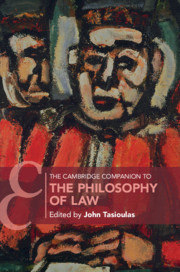Book contents
- The Cambridge Companion to the Philosophy of Law
- Cambridge Companions to Law
- The Cambridge Companion to the Philosophy of Law
- Copyright page
- Dedication
- Contents
- Contributors
- Introduction
- Part I General Theory
- Part II Values
- Part III Special Theory
- 12 Causation and Responsibility
- 13 Punishment
- 14 Constitutional Law
- 15 Civil Rights and Liberties
- 16 Criminal Law
- 17 Contract
- 18 Tort Law and Its Theory
- 19 Property Law
- 20 International Law
- Index
13 - Punishment
from Part III - Special Theory
Published online by Cambridge University Press: 15 June 2020
- The Cambridge Companion to the Philosophy of Law
- Cambridge Companions to Law
- The Cambridge Companion to the Philosophy of Law
- Copyright page
- Dedication
- Contents
- Contributors
- Introduction
- Part I General Theory
- Part II Values
- Part III Special Theory
- 12 Causation and Responsibility
- 13 Punishment
- 14 Constitutional Law
- 15 Civil Rights and Liberties
- 16 Criminal Law
- 17 Contract
- 18 Tort Law and Its Theory
- 19 Property Law
- 20 International Law
- Index
Summary
Punishment is a burden that some agent with relevant powers deliberately imposes on someone else as a purportedly justified response to conduct that she, the punishing agent, views as wrong.1 The agent might view the conduct as wrong in itself or as wrong simply because it breaches an authoritative rule. But the burden imposed on the supposed wrongdoer is normally intended to communicate the punisher’s justified condemnation of the wrong in question. The punishing agent not only has the power to inflict hard treatment in response to the conduct, but also, usually, claims to have the authority – the right – to do so. The punishee is allegedly responsible for the (putative) wrong, in the sense of meeting the conditions that would make it fair or fitting or otherwise appropriate to impose the punishment – though of course he in fact might not be responsible for it. These features – that punishment is justified, that the punishing agent has the relevant authority, and that those punished are responsible – are the sources of most of the philosophical issues that arise in regard to punishment, and we examine them in more detail in this chapter.
- Type
- Chapter
- Information
- The Cambridge Companion to the Philosophy of Law , pp. 253 - 270Publisher: Cambridge University PressPrint publication year: 2020
- 1
- Cited by

